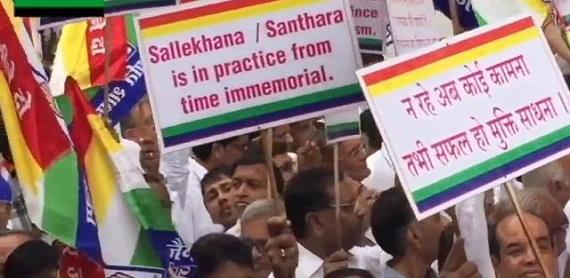BERITA
Salvation or Suicide: India Jain Community Protests a Ban on Fasting to Death

Asia Calling, New Delhi - In the Indian province of Rajasthan, the High Court recently declared santhara or fasting until death as illegal. It is resulted on a protest from Jain believersin capital New Delhi.
“Live and let live,” shout hundreds of Jain believers as they march through the streets of New Delhi. Similar protests have also been held in other Indians cities. Their message is clear: “Santhara is not suicide”.
Santhara is fasting to death - it’s Jainism it is known as a practice to detach from the world. In India there are around 4.5 million Jain believers, less than 1 percent of the total population. An estimated 200 people, mostly elderly, are believed to die in the country every year because of the practice.
Madahv Mishra is a lawyer who sought the ban on Santhara. “Elderly people are vulnerable. They need more care and attention, and you’re leaving them to die saying that they will attain salvation. There’s a real danger that people may be misusing the practice to starve their unwanted elders to death,” he said.
In August, Rajasthan’s High Court declared that fasting is similar to suicide and us therefore punishable.
But Jain priest Pandit Ratanlal says it’s the most dignified way to die. “This is the final stage of the spiritual journey, the ultimate test of our spiritual awareness,” he explained.
According to the belief, Santhara is not for everyone. Virsagar Jain is professor of philosophy. “It’s recommended only in the situations when death already appears to be approaching. So it’s when there is no hope left, for someone who is terminally ill, or they are so old that they are not able to do anything,” he said, adding Shantara is adopted as a way to embrace death with patience, peace of mind and in a state of meditation.
But for human rights activists like Kavita Shrivastav, the practice has become coercive recently. Earlier, there was a space for someone undergoing the practice to rethink and change their mind at anytime during the fast. But now, there’s no point of return. Once you have announced it, you have to complete it.”
Pradeep Jain from the Jain community insists the verdict is an attack to their right of religion. “This is religious freedom. The practice is not new. It’s been going on for thousands of years. And you can’t call it suicide because we don’t seek for death, but spiritual perfection.”
The case is now in the Supreme Court, which has allowed the practice temporarily. But the final verdict will not be delivered in a near future…
- eng
- India
- kebebasan beragama
Komentar (0)
KBR percaya pembaca situs ini adalah orang-orang yang cerdas dan terpelajar. Karena itu mari kita gunakan kata-kata yang santun di dalam kolom komentar ini. Kalimat yang sopan, menjauhi prasangka SARA (suku, agama, ras dan antargolongan), pasti akan lebih didengar. Yuk, kita praktikkan!